America Football Club (Rio de Janeiro)
America Football Club, usually abbreviated to America, is a Brazilian football team based in the city of Rio de Janeiro, in the northern neighbourhood of Tijuca. The team compete in Campeonato Carioca, the top tier of the Rio de Janeiro state football league.
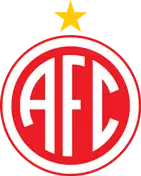 | |||
| Full name | America Football Club | ||
|---|---|---|---|
| Nickname(s) | Diabo (Devil), Sangue (Blood), Mecão and Rubro Carioca | ||
| Founded | September 18, 1904 | ||
| Ground | Estádio Giulite Coutinho | ||
| Capacity | 13,544 | ||
| President | Sidney Santana | ||
| Head coach | Josué Teixeira | ||
| League | Campeonato Carioca | ||
| 2021 | Carioca | ||
| Website | Club website | ||
|
| |||
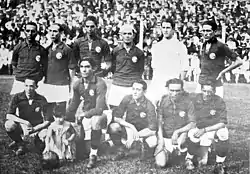
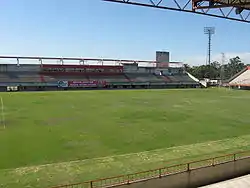
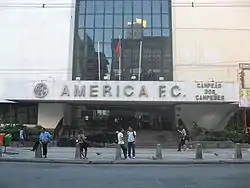

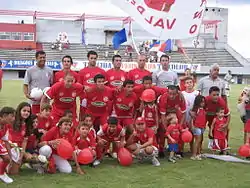
Founded on September 18, 1904, the club competed in the Campeonato Brasileiro Série A several times, winning the state championship seven times. The club's home stadium is the Estádio Giulite Coutinho, which has a capacity of 16,000. They play in red shirts, white shorts and red socks.
The football anthem composer Lamartine Babo was a supporter of America.[1] America's mascot is a devil. America also sponsors a beach American football team, the America Red Lions.[2]
History
On September 18, 1904, Alberto Koltzbucher, Alfredo Guilherme Koehler, Alfredo Mohrsted, Gustavo Bruno Mohrsted, Henrique Mohrsted, Jayme Faria Machado and Oswaldo Mohrsted founded America Football Club.[3] In 1905, America, together with Bangu, Botafogo, Petrópolis, Fluminense and Futebol Atlético Clube founded Liga de Football do Rio de Janeiro (Rio de Janeiro Football League), which was the first football federation of Rio de Janeiro.[3] In 1913, the club won the state championship for the first time.[4]
For the 1971 season, the club competed in the national Championship's first edition, finishing in 11th place.[5]
The yellow star just above their emblem represents their win in the Tournament of the Champions (Torneio dos Campeões) in 1982, which was a tournament organized by CBF to serve as a preview to the Campeonato Brasileiro Série A tournament. Flamengo declined the invitation so America, the team with the best record after the selected teams, was invited to fill the spot. America won the tournament by beating Guarani in overtime at Maracanã stadium.[6]
In 2006, America was the runner-up of Taça Guanabara. America played the final against Botafogo.[7]
In 2008, America suffered a major blow by being relegated to the Second Division of the Campeonato Carioca. However, they won the Second Division in 2009, thus being promoted to the first level in 2010.[8] However, the club were relegated again in 2011 and continues playing the Second Division in 2015, returns to the elite of the Campeonato Carioca after five years vying for the Serie B, after beating the Americano.[9]
Honors
| National | |||
|---|---|---|---|
| Campetition | Titles | Seasons | |
| Torneio dos Campeões | 1 | 1982 | |
| Regionais | |||
| Campetition | Titles | Seasons | |
| Taça Ioduran | 1 | 1917 | |
| Taça Brasil - Zona Sul | 1 | 1961 | |
| Estaduais | |||
| Campetition | Titles | Seasons | |
| Campeonato Carioca | 7 | 1913, 1916, 1922, 1928, 1931, 1935, 1960 | |
| Campeonato Carioca Second Division | 2 | 2009, 2015, 2018 | |
| Taça Guanabara | 1 | 1974 | |
| Taça Rio | 1 | 1982 | |
| Torneio Início | 1 | 1949 | |
| Troféu João Ellis Filho | 1 | 2010 | |
| Taça Corcovado | 1 | 2017 | |
Other state titles
 Third Stage of the Campeonato Carioca: 1955
Third Stage of the Campeonato Carioca: 1955 Taça Jayme de Carvalho: 1976
Taça Jayme de Carvalho: 1976 Rio de Janeiro Extra Tournmanent: 1938 and 1952
Rio de Janeiro Extra Tournmanent: 1938 and 1952 Torneio Relâmpago: 1945
Torneio Relâmpago: 1945 Taça Eficiência: 1936
Taça Eficiência: 1936 Taça Disciplina: 1947, 1949, 1965, 1969, 1970 and 1983
Taça Disciplina: 1947, 1949, 1965, 1969, 1970 and 1983 Taça Fernando Loretti Jr. de Aspirantes: 1944
Taça Fernando Loretti Jr. de Aspirantes: 1944 Torneio Ary Barroso (mixed teams): 1965*.
Torneio Ary Barroso (mixed teams): 1965*.
International tournaments
- (1955)
- (1961)
- (1961)
- (1962)
- (1967)
- (1973)
- (1983)
National tournaments
- (1968)
- (1968)
Youth teams
 Campeonato Carioca de 2° Quadro: 6 times (1919, 1923, 1926, 1929, 1930 and 1932)
Campeonato Carioca de 2° Quadro: 6 times (1919, 1923, 1926, 1929, 1930 and 1932) Amateur Campeonato Carioca: 2 times (1936 and 1940)
Amateur Campeonato Carioca: 2 times (1936 and 1940) Campeonato Carioca Carioca de Aspirantes: 1968
Campeonato Carioca Carioca de Aspirantes: 1968 Campeonato Carioca de Juniores: 6 times (1933, 1934, 1935, 1938, 1940 and 1941)
Campeonato Carioca de Juniores: 6 times (1933, 1934, 1935, 1938, 1940 and 1941) Campeonato Estadual de Juniores da Série B: (2012)
Campeonato Estadual de Juniores da Série B: (2012) Torneio Início de Juniores: 1953
Torneio Início de Juniores: 1953 Campeonato Carioca Carioca de Infanto-Juvenis: 2 times (1969 and 1979)
Campeonato Carioca Carioca de Infanto-Juvenis: 2 times (1969 and 1979) Campeonato Carioca Carioca de Infantil: 1981
Campeonato Carioca Carioca de Infantil: 1981 Campeonato Carioca Carioca Especial de Infantil (under-15): 2012
Campeonato Carioca Carioca Especial de Infantil (under-15): 2012 Campeonato Carioca Carioca de Juvenis: 1991
Campeonato Carioca Carioca de Juvenis: 1991 Copa do Brasil de Juniores runners-up: 2001
Copa do Brasil de Juniores runners-up: 2001
*Undefeated.
**Torneio Extra Carlos Martins da Rocha.
- Women's team
- Campeonato Carioca de Futebol Feminino runneers-up:2007
Current squad
According to the CBF register.
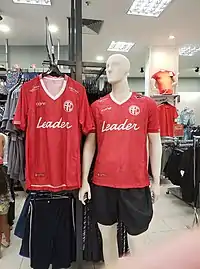
Note: Flags indicate national team as defined under FIFA eligibility rules. Players may hold more than one non-FIFA nationality.
|
|
Top goalscores
- Luisinho Lemos : 311
- Edu : 212
- Maneco : 187
- Plácido: 167
- Carola : 158
- Chiquinho : 102
Highest attendances
- America 1–4 Flamengo, 147.661(139,599 people seated), April 4, 1956
- America 0–2 Fluminense, 141,689 (120,178 people seated), June 9, 1968
- America 1–2 Vasco, 121,765 (104,775 people seated), January 28, 1951
- America 1–0 Flamengo, 104,532, April 25, 1976
- America 5–1 Flamengo, 102,002 (94,516 people seated), April 1, 1956
- America 2–1 Bonsucesso, 101.363, July 25, 1973
- America 2–0 Fluminense, 100,635 (92,516 people seated), March 17, 1956
- America 2–1 Fluminense, 98,099, December 18, 1960
- America 1–0 Fluminense, 97,681, September 22, 1974
- America 0–1 Fluminense, 96,035, April 27, 1975
- America 4–2 Benfica (POR), 94,642 (87,686 people seated), July 3, 1955
- America 1–1 Flamengo, 93,393, May 19, 1969
Mascot
One controversial aspect of the club is the official mascot: the Diabo (devil), depicted as a red demon complete with horns, pointy beard, curled moustache, a long fat arrow-pointed tail, hooved feet and a black cape. The club's old stadium was nicknamed Caldeirão do Diabo ("Devil's Cauldron"). In 2006 some of the club's fans, supported by then-manager Jorginho who is an Evangelical Christian, attempted to replace the diabo with a bald eagle, claiming that the devil was "unlucky". However, as the "diabo" is a traditional part of the club's story and with the original mascot the club conquered its greatest achievements and there was no change in the club's fortunes with the new mascot, the replacement was abandoned and it was considered that Jorginho's opinion was motivated by "religious fanaticism".[10]
Clubs named after America
America is the Brazilian club with the largest number of other clubs named after it, who copy even its symbols. Some of its clones include: América of Natal, América of São José do Rio Preto, América of Três Rios, América of Amazonas, América Futebol Clube (Teófilo Otoni), América of Ceará.[11]
References
- "Lamartine Babo" (in Portuguese). E-Biografias. Retrieved June 2, 2008.
- "Histórico Red Lions" (in Portuguese). América Red Lions. Archived from the original on December 5, 2007. Retrieved July 8, 2008.
- "America Football Club" (in Portuguese). Campeões do Futebol. Archived from the original on June 15, 2008. Retrieved June 2, 2008.
- "Rio de Janeiro Championship 1913" (in Portuguese). RSSSF Brasil. Archived from the original on March 13, 2008. Retrieved June 2, 2008.
- "Brazil 1971 Championship – Primeiro Campeonato Nacional de Clubes" (in Portuguese). RSSSF Brasil. Archived from the original on October 31, 2007. Retrieved June 2, 2008.
- "Campeonatos" (in Portuguese). America Football Club. Archived from the original on January 21, 2009. Retrieved December 19, 2008.
- "Rio de Janeiro State League 2006" (in Portuguese). RSSSF Brasil. Archived from the original on June 2, 2008. Retrieved June 2, 2008.
- Luiz Maurício Monteiro (November 25, 2009). "Com Romário em campo, America bate Artsul e é campeão da Série B do Rio" (in Portuguese). Sidney Rezende. Archived from the original on November 29, 2009. Retrieved November 28, 2009.
- "Emoção e alegria: América vence e volta à Primeira Divisão do Rio depois de quatro anos". ESPN. Retrieved July 16, 2015.
- "Técnico do America veta palavrões e diabo como mascote" (in Portuguese). Planeta Gol. Archived from the original on July 6, 2011. Retrieved October 19, 2008.
- Enciclopédia do Futebol Brasileiro Lance Volume 1. Rio de Janeiro: Aretê Editorial S/A. 2001. p. 120. ISBN 85-88651-01-7.